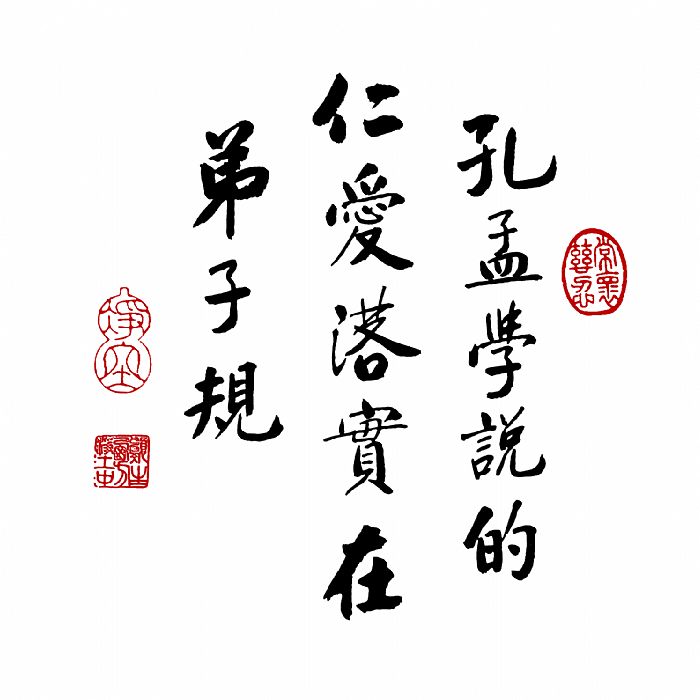【谨】BEING MINDFUL IN DAILY LIFE
【朝起早。夜眠迟。老易至。惜此时。】
Get up early and go to bed at a reasonable time.
Knowing how time flies, we should treasure every day.
【晨必盥。兼漱口。便溺回。辄净手。】
When we get up, we should wash our face and brush our teeth.
After using the toilet, we should always wash our hands.
【冠必正。纽必结。袜与履。俱紧切。】
Our hat should be properly put on, clothing correctly buttoned, and socks and shoes neatly worn.
【置冠服。有定位。勿乱顿。致污秽。】
We should put our clothes away in their proper places.
We should not leave them lying around for they will get dirty that way.
【衣贵洁。不贵华。上循分。下称家。】
It is more important that our clothes be neat and clean than fashionable and expensive.
We should wear what is suitable and appropriate for our age, and within our family’s means.
【对饮食。勿拣择。食适可。勿过则。】
When eating and drinking, do not be fussy.
Eat only the right amount; do not overeat.
【年方少。勿饮酒。饮酒醉。最为丑。】
When we are young, we should not drink alcohol.
The behavior of those who are drunk is unsightly.
【步从容。立端正。揖深圆。拜恭敬。】
Walk in an unhurried manner and always stand up straight.
Whether greeting friends or elders, do so properly and with respect.
【勿践阈。勿跛倚。勿箕踞。勿摇髀。】
Do not step on doorsills or stand leaning on one leg.
When sitting, do not sprawl or fidget.
【缓揭帘。勿有声。宽转弯。勿触棱。】
When entering a room, we should open the door carefully.
When walking, we should be aware of our surroundings so as to not bump into anything.
【执虚器。如执盈。入虚室。如有人。】
Hold empty containers just as carefully as if they were full.
Enter empty rooms as if they were occupied.
【事勿忙。忙多错。勿畏难。勿轻略。】
Avoid doing things in a hurry,
since acting in haste will lead to many mistakes.
Do not be afraid of a task that is difficult
or become careless when a job is easy.
【斗闹场。绝勿近。邪僻事。绝勿问。】
Keep away from rowdy places.
Do not be curious about things that are bad or unusual.
【将入门。问孰存。将上堂。声必扬。】
【人问谁。对以名。吾与我。不分明。】
When we are about to enter a house, we should ask if anyone is inside.
As we enter, we should make ourselves heard.
If someone asks who it is, we should say our name,
not “me” because such a reply is not clear.
【用人物。须明求。倘不问。即为偷。】
Before using something that belongs to another,
we should ask for permission.
If we do not ask, it is stealing.
【借人物。及时还。后有急。借不难。】
After we borrow from others, we should return the items on time.
Later, if we have an urgent need, we will be able to easily borrow from them again.
skip to main |
skip to sidebar














大自然音乐1

Labels
- 《孝经》 (8)
- 《孝经》卡 (1)
- Educational Poster (28)
- Environmental/环保篇 (11)
- Guidelines To A Happier Life (Dizigui English Version) (8)
- Healthy Food (3)
- Liao-Fan’s Four Lessons (2)
- Path to Peace (7)
- Recommendations (2)
- VSS News (1)
- 世界宗教是一家 (5)
- 人生 (18)
- 人生教育 (20)
- 健康篇 (16)
- 八德四维 (十二德目) (5)
- 功过格 (1)
- 命运-自我作篇 (11)
- 善行篇 (2)
- 子曰 (16)
- 孝篇 (10)
- 学习篇 (4)
- 宣言 (1)
- 小同学作品 (3)
- 弟子规学习卡 (41)
- 弟子规漫画 (24)
- 德育故事 - 孝篇 (18)
- 慈济歌 (1)
- 描红 (3)
- 教育图片 (10)
- 智慧语 (8)
- 格言 (3)
- 演讲 (1)
- 生活教育 (41)
- 真人真事 (1)
- 礼仪 (2)
- 科学根据 (6)
- 笔顺 (4)
- 群書治要 (8)
- 老人言 (8)
- 营养素食物 (8)
- 觉悟的教育 (14)
- 通告 (1)
- 静思语 (4)
- 墨宝 (5)


每一個宗教核心理念都是愛
和平钟声

Blog Archive
-
▼
2010
(199)
-
▼
November
(85)
- We are one
- Guidelines & Principles To Ensure A Happier Today ...
- Guidelines & Principles To Ensure A Happier Today ...
- Guidelines & Principles To Ensure A Happier Today ...
- Guidelines & Principles To Ensure A Happier Today ...
- 惜 时
- 我为你祝福
- 行立坐卧有威仪
- 忠恕之道
- 古之君子 以剑自卫乎?
- 君子有三畏
- 君子有三戒
- 德才兼备
- 忍能解决问题
- 感受别人的痛苦,增长自己的爱心
- 诚 实
- 立 志
- 节俭知足,平安到老
- 帮助别人要积极
- 兄友弟恭
- 懂礼貌,守规矩
- 勤劳好孩子
- 信心、毅力、勇气
- 伞是遮盖
- 弟子规学习卡 (28 of 40)
- 弟子规学习卡 (29 of 40)
- 弟子规学习卡 (30 of 40)
- 弟子规学习卡 (31 of 40)
- 弟子规学习卡 (32 of 40)
- 弟子规学习卡 (33 of 40)
- 弟子规学习卡 (34 of 40)
- 弟子规学习卡 (35 of 40)
- 弟子规学习卡 (36 of 40)
- 弟子规学习卡 (37 of 40)
- 弟子规学习卡 (38 of 40)
- 弟子规学习卡 (39 of 40)
- 弟子规学习卡 (40 of 40)
- 有两件事不能等
- 快乐面对己之命运
- 慎 言
- 小天使
- 生命的枯荣全视你怎么去栽培
- 品行一百分
- 仲由负米
- 寿昌弃官
- 李忠辟震
- 实夫拜虎
- 吴猛饱蚊
- 黔娄尝粪
- 老莱斑衣
- 陆绩怀橘
- 闵损芦衣
- 庭坚涤秽
- 江革负母
- 黄香温凊
- 孟宗哭竹
- 丁兰刻木
- 蔡顺拾椹
- 亲尝汤药
- 虞舜耕田
- Why It's Green To Go Vegetarian
- Think and Speak Carefully
- 消除不孝之习气
- 己不欲 即速已
- 勿以善小而不为
- Treat All With Respect
- 命自我作 福自我求
- 谢谢你哦!
- 《孝经》浅解 (四)
- 欢 喜
- 百善孝为先
- 舍 得
- 敬人者人恒敬之,爱人者人恒爱之
- 宽以待人
- 修身为本 教学为先
- 凡是人 皆须爱
- Help others but not harm
- 君子亦有忧乎?
- 一朝之忿,忘其身以及其亲,非惑与?
- Click on picture to see original size. 点击图片可看原图。
- 造如是因 得如是果
- 三思而后行
- Guidelines & Principles To Ensure A Happier Today ...
- Click on picture to see original size. 点击图片可看原图。
- Guidelines & Principles To Ensure A Happier Today ...
-
▼
November
(85)

Total Pageviews

生活在感恩的世界

是的,我是素食者


Join Me . . Go Veggie!

Thanks for being kind to animals *** 泛爱众 - 爱护人、爱护动物、爱护大自然

